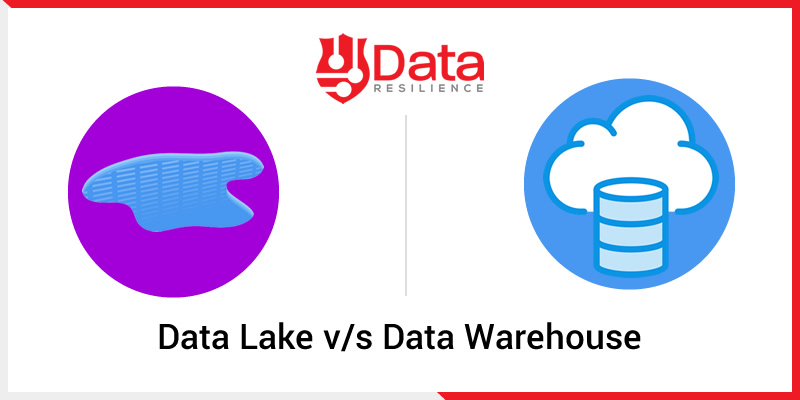Data lake and data warehouse are two types of repository for storing big data. However, this is where the similarity ends, since in general, a data lake has a flat architecture and is best suited to unstructured data, whereas data in a data warehouse is structured, and has data stored in files or folders.
The four (4) key differences between data lake and data warehouse:
| Data Aspect | DATA LAKE | DATA WAREHOUSE |
|---|---|---|
| Data Structures | Raw | Processed |
| Purpose | Not Yet Determined | Currently In Use |
| Users | Data Scientists | Business Users |
| Accessibility | Highly accessible and quick to update | Complex to make changes |
Data Structures: Raw vs Processed
The greatest anomaly between a data lake and data warehouse is that data lake houses raw and unprocessed data whereas data warehouse stores refined and processed data. On account of this, data lakes require much more storage space than a data warehouse. Raw data is malleable and can be analysed for any purpose and is ideal for machine learning. But the downside is that data lakes run the risk of turning into data swamps without appropriate data quality and data governance in place.
In general, data warehouse stores only processed data and therefore save on costly storage space by not maintaining data that may never be used, as in a data lake.
Purpose of Data: Undetermined vs being used
The reason for individual information pieces in a data lake isn’t fixed. Crude information streams into a data lake, often in light of unknown future use. This implies data lakes has less association and less filtration of information than their data warehouse partner.
Processed data can be defined as ‘crude information that has been put to a particular use’. Since data warehouses house processed information, the majority of the information in a data warehouse has been utilised for a particular reason inside the association. This implies extra storage space isn’t squandered on information that may never be utilised.
Users: Data Scientists versus business experts
Data lakes are frequently hard to explore by those new to natural information. Crude, unstructured information, as a rule, requires a data scientist and particular skills, knowledge, experience, and tools to comprehend and interpret it for particular business use. By comparison, data warehouses are more commonly used by business users that have less knowledge of the inner workings of the data repositories.
Accessibility: Flexibility vs Security
Data Lakes have little or no structure and are therefore easy to change and easy to access, with changes quickly to reflect current needs, since data lakes have few limitations. Data Warehouses are more structured and they are easier to decode but the limitations of structure make it difficult and costly to make changes.
Data Lake versus Data Warehouse
Companies frequently need both. Data lakes were resulting from the need to tackle big data and benefit from the crude and unstructured information for Artificial Intelligence, however, data warehouses are generally more useful and usable to business users.
Healthcare: Data Lakes store unstructured data
Data warehouses have been utilised for a long time in the medical services industry yet have never been colossally effective. As a result of the unstructured idea of a great part of the information in healthcare (doctors notes, clinical information, and so forth) and the requirement for constant sources of knowledge, data warehouses are commonly not a perfect model. Data lakes offer a combination of structured data and unstructured data which are generally a better fit for the healthcare companies.
Education Challenges
As of late, the use of big data in the education sector has turned out to be gigantically obvious. Information about students, evaluations, attendance, and participation, learning outcomes can not only help failed students get back on track, but can also really help anticipate potential issues before they occur. Adaptable big data implementations have also helped instructive establishments streamline charging, improve raising money, and that’s only the tip of the iceberg.
Finance: Data warehouse significance to the masses
In the finance, banking and insurance industries, a data warehouse is frequently the best storage model since it may very well be organised for access by the whole organisation as opposed to a data scientist only.
Big Data has helped the financial industry make large strides with data warehouses seen as a major player in those steps. The main reason a financial service-related administrations organisation might be influenced away from such a model is that it is more cost-effective.
The choice between Data Lake or Data Warehouse
The “data lake versus data warehouse” discussion has likely quite recently started, however, the key contrasts in structure, procedure, clients, and generally dexterity make each model extraordinary. Contingent upon your organisation’s business requirements, building up the correct data lake or data warehouse to meet these needs will be instrumental in their development.
For more information, visit www.dataresilience.com.au or drop us a note at [email protected]

